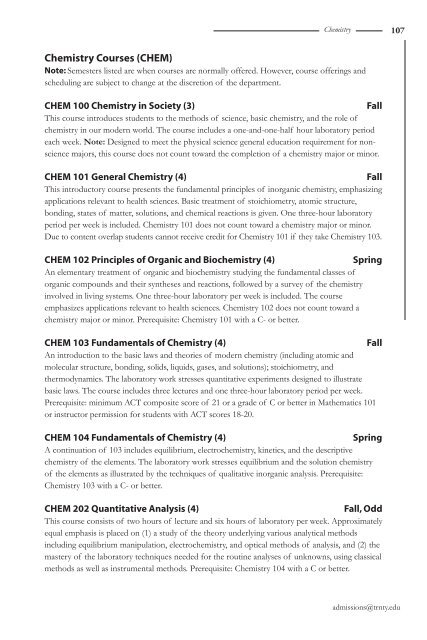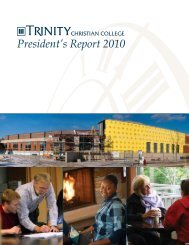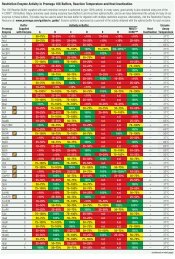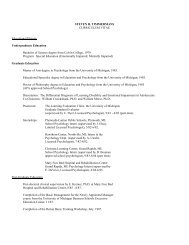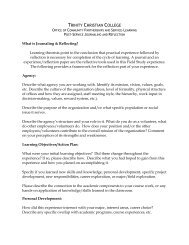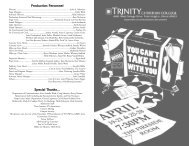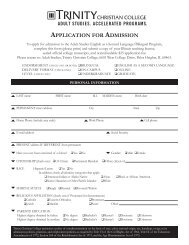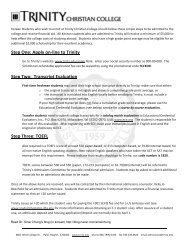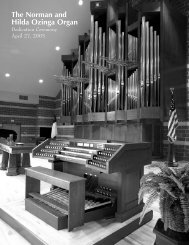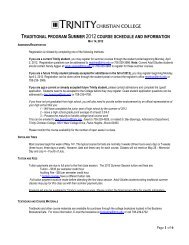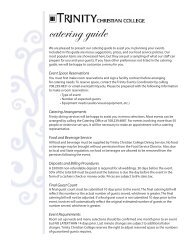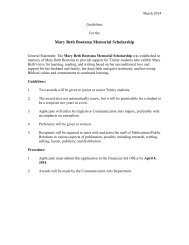College's catalog - Trinity Christian College
College's catalog - Trinity Christian College
College's catalog - Trinity Christian College
Create successful ePaper yourself
Turn your PDF publications into a flip-book with our unique Google optimized e-Paper software.
Chemistry<br />
107<br />
Chemistry Courses (CHEM)<br />
Note: Semesters listed are when courses are normally offered. However, course offerings and<br />
scheduling are subject to change at the discretion of the department.<br />
CHEM 100 Chemistry in Society (3)<br />
Fall<br />
This course introduces students to the methods of science, basic chemistry, and the role of<br />
chemistry in our modern world. The course includes a one-and-one-half hour laboratory period<br />
each week. Note: Designed to meet the physical science general education requirement for nonscience<br />
majors, this course does not count toward the completion of a chemistry major or minor.<br />
CHEM 101 General Chemistry (4)<br />
Fall<br />
This introductory course presents the fundamental principles of inorganic chemistry, emphasizing<br />
applications relevant to health sciences. Basic treatment of stoichiometry, atomic structure,<br />
bonding, states of matter, solutions, and chemical reactions is given. One three-hour laboratory<br />
period per week is included. Chemistry 101 does not count toward a chemistry major or minor.<br />
Due to content overlap students cannot receive credit for Chemistry 101 if they take Chemistry 103.<br />
CHEM 102 Principles of Organic and Biochemistry (4)<br />
Spring<br />
An elementary treatment of organic and biochemistry studying the fundamental classes of<br />
organic compounds and their syntheses and reactions, followed by a survey of the chemistry<br />
involved in living systems. One three-hour laboratory per week is included. The course<br />
emphasizes applications relevant to health sciences. Chemistry 102 does not count toward a<br />
chemistry major or minor. Prerequisite: Chemistry 101 with a C- or better.<br />
CHEM 103 Fundamentals of Chemistry (4)<br />
Fall<br />
An introduction to the basic laws and theories of modern chemistry (including atomic and<br />
molecular structure, bonding, solids, liquids, gases, and solutions); stoichiometry, and<br />
thermodynamics. The laboratory work stresses quantitative experiments designed to illustrate<br />
basic laws. The course includes three lectures and one three-hour laboratory period per week.<br />
Prerequisite: minimum ACT composite score of 21 or a grade of C or better in Mathematics 101<br />
or instructor permission for students with ACT scores 18-20.<br />
CHEM 104 Fundamentals of Chemistry (4)<br />
Spring<br />
A continuation of 103 includes equilibrium, electrochemistry, kinetics, and the descriptive<br />
chemistry of the elements. The laboratory work stresses equilibrium and the solution chemistry<br />
of the elements as illustrated by the techniques of qualitative inorganic analysis. Prerequisite:<br />
Chemistry 103 with a C- or better.<br />
CHEM 202 Quantitative Analysis (4)<br />
Fall, Odd<br />
This course consists of two hours of lecture and six hours of laboratory per week. Approximately<br />
equal emphasis is placed on (1) a study of the theory underlying various analytical methods<br />
including equilibrium manipulation, electrochemistry, and optical methods of analysis, and (2) the<br />
mastery of the laboratory techniques needed for the routine analyses of unknowns, using classical<br />
methods as well as instrumental methods. Prerequisite: Chemistry 104 with a C or better.<br />
admissions@trnty.edu


